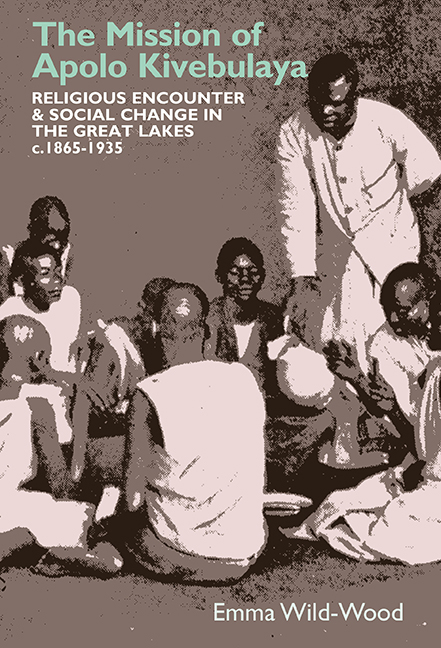Book contents
- Frontmatter
- Dedication
- Contents
- List of Maps and Photographs
- Acknowledgements
- Note on Orthography and Glossary
- Timeline
- Introduction: Kivebulaya and religious change in the Great Lakes
- 1 The afterlife of Saint Canon Apolo (1933 onwards)
- 2 Waswa, a commoner in the Kingdom of Buganda (c.1865–c.1884)
- 3 Munubi, a foot soldier in battle and evangelism (c.1884–1895)
- 4 Itinerant teacher ‘from Europe’ in Toro (1895–1905)
- 5 Clerk in holy orders (1905–1915)
- 6 To all Ituri nations under Belgian rule (1915–1925)
- 7 Reverend Canon Apolo, elder and churchman (1925–1933)
- Conclusion: African missionaries, religious encounter and social change 270
- Sources
- Index
- EASTERN AFRICAN STUDIES
3 - Munubi, a foot soldier in battle and evangelism (c.1884–1895)
Published online by Cambridge University Press: 30 April 2020
- Frontmatter
- Dedication
- Contents
- List of Maps and Photographs
- Acknowledgements
- Note on Orthography and Glossary
- Timeline
- Introduction: Kivebulaya and religious change in the Great Lakes
- 1 The afterlife of Saint Canon Apolo (1933 onwards)
- 2 Waswa, a commoner in the Kingdom of Buganda (c.1865–c.1884)
- 3 Munubi, a foot soldier in battle and evangelism (c.1884–1895)
- 4 Itinerant teacher ‘from Europe’ in Toro (1895–1905)
- 5 Clerk in holy orders (1905–1915)
- 6 To all Ituri nations under Belgian rule (1915–1925)
- 7 Reverend Canon Apolo, elder and churchman (1925–1933)
- Conclusion: African missionaries, religious encounter and social change 270
- Sources
- Index
- EASTERN AFRICAN STUDIES
Summary
Introduction
‘The greed to become a man of God seized me’, recorded Kivebulaya in 1894. He had just returned from fighting in the destructive British-led offensive against the Banyoro and he decided to enrol in the baptismal class. The verb translated as ‘seized’ comes from kukwata, a word that means ‘to touch’, but is frequently used to suggest being caught or overwhelmed. It can mean ‘rape’ and ‘arrest’. It is also one of a number of words used for possession by a spiritual power, hence its use here. Religious engagement – of whatever tradition – could be experienced as being assailed by a passionate conviction. The violence of kukwata’s common usage is also indicative of the circumstances in which Kivebulaya made his slow way towards baptism in the Native Anglican Church. Kivebulaya's gradual interest in Christianity began some time after his move nearer to the capital around the time of the death of Kabaka Mutesa and the succession of Mwanga II in 1884. His autobiography becomes more detailed as it gains pace towards his baptism. It shows how his conversion was enveloped in the highly charged political events of the day. Accounts of soldiering and conflict are juxtaposed with accounts of reading, praying and attending church. Kivebulaya does not dwell on the details of warfare, but he was involved in the violent seizure of lands and people at the same time as he felt compelled to become a Christian. His initially hesitant decisions to read, to study the Bible and to secure a patron are presented as a war-weary counterpoint to violence, but one which, nevertheless had its own forceful compulsion. The autobiography foregrounds novel events and experiences as Kivebulaya committed himself to the Protestant Christian group and became a teacher. His actions ruptured many of the commitments to kin and custom that were discussed in the previous chapter. Yet his response to the fluidity of the societal change he embraced was patterned upon previous social expectations of mukopi displays of honour (ekiitibwa) towards seniors in order to form alliances (okusenga).
The primary role of this chapter is not to retell the well-known history of the era, which has been ably expounded by others. Rather, the chapter examines the motivational force of new religious beliefs and practices in their historic context.
- Type
- Chapter
- Information
- The Mission of Apolo KivebulayaReligious Encounter & Social Change in the Great Lakes c. 1865–1935, pp. 95 - 128Publisher: Boydell & BrewerPrint publication year: 2020



